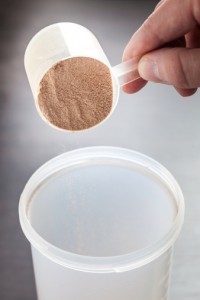
We are surrounded by fats and carbohydrates. Whether it’s tasty snacks, or bad junk food, all these carbs and fat can keep you from hitting your fitness goals unless you also have balanced them with a proper amount of protein, But, how much protein is enough?
First off, protein is crucial for muscle synthesis, as well as making you feel full – in comparison, if you eat a whole loaf of bread all by itself, you’re probably not going to feel very satisfied. And, there are more and more articles about how important protein is for rebuilding your muscles post-workout as well. But, there are two different types of protein out there. Plant-based protein and animal-based protein. And, animal products are typically the most efficient sources of protein. The Journal of Nutrition found in their 2015 study that beef-, milk-, and egg-based options were more effective than plant-based sources for supporting muscle synthesis in athletes. Additionally, compared to animal-based proteins, plant-based proteins have lower digestibility rates, which may mean that you’ll absorb less protein per ounce compared to animal-based proteins. Animal-based protein sources are considered “complete” because they have all nine of the essential amino acids. Plant-based proteins may contain fewer essential amino acids – the ones that your body can’t create on its own and instead must be consumed through food.
If you’re a vegetarian, and don’t wish to eat protein from animal-based sources, this doesn’t mean you won’t get enough protein from plant-based sources. But, you’ll need to get a wider variety of protein – i.e. different plant sources of protein, in order to make sure you get the full measure of essential amino acids. For example, soy and quinoa are complete plant-based protein sources, and you get also mix nuts & beans with rice or hummus to get a complete protein source. And, as long as you get your “mix” in a 24 hour period, you don’t have to always mix them in the same meal.
Also, although protein shakes and bars are convenient, they shouldn’t be your primary source of protein. That’s why they are called “supplements” – they should supplement what you should already be getting from “real foods”. With real foods, you get the full benefit of additional micronutrients your diet requires. Protein shakes and bars are a great addition to your diet to help with post-workout recovery and “topping off’ your protein intake to make sure you’re getting enough during the day.
When it comes to protein powders, make sure you get the best kind – if you’re not following a strict plant-based diet, a mix of casein protein (great for building muscle quickly, as the amino acids are released slowly – great for post workout recovery) and whey protein (which is very pure, as all fats and lactose have been stripped out during processing). But if you need a good protein powder that is purely plant-based, look for pea-based protein powders. Just make sure you have a well balanced diet along with pea-based protein powders, as these powders are lacking a full complement of amino acids.
Finally – how much protein should you get each day? Try this formula – you need protein 4 times per day, and shoot for 25 grams of protein per serving – so around 100 grams of protein per day. This can be a combination of all the protein sources mentioned above. You need to spread your protein intake around during the day, because your body can only process up to about 30 grams of protein at a time. So, if you missed having any protein at breakfast, you can’t double up at lunch to get proper amount per day. A small chicken breast, 3 or 4 eggs, a small can of tuna, or a cup of lentils – each of these is around the proper amount for each serving. And, if you end your day with a protein shake, or a cup of cottage cheese, or some Greek yogurt, you’ll be at the proper amount per day!

